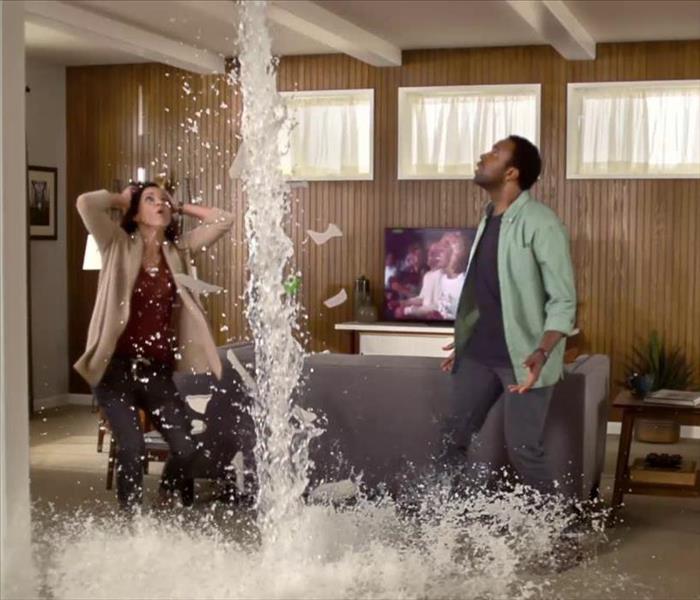5 Things You Need To Know About Water Damage
3/15/2019 (Permalink)
Has water damage happened to you? Here’s what to do next to keep it from getting worse.
When a pipe bursts, a drain backs up, or a flood occurs in your home, it can be hard to see past the mess. A million questions will run through your mind.
What do I do now?
What’s going to happen?
Is my stuff ruined?
And the most important question of all: Will my homeowner’s insurance cover the damage?
There’s no doubt about it. Water damage is extremely stressful, and the more you know about it, the better you’ll be able to decide how to address it. Here are five things that every homeowner needs to know about water damage.
1. There are different insurance policies for flood damage and water damage.You might think that water is water, whether it’s from flooding or a burst pipe, but flood damage is not covered under homeowner’s insurance. If you live in an area likely to experience flooding, you will probably already have a separate policy through the National Flood Insurance Policy (NFIP). When you report the claim to the insurance company, make sure to specify whether the claim is for water damage or for flood damage, so they can begin adjusting your claim correctly.
2. Not all water damage is covered by your insurance.It is a good idea to look over your insurance policy and familiarize yourself with any exclusion to your water damage coverage. For instance, most policies cover sudden damage, like water damage from a really bad storm or from an overflowing washing machine. On the other hand, any water damage that happens because you didn’t maintain the property may be excluded, as well as gradual leaks that caused water damage over time.
3. Once water damage has happened, the clock is ticking before it gets worse.When your property has been water damaged, you don’t have the luxury of waiting around for a convenient time to start the cleanup. Secondary damage from mold growth can present serious health risks associated with mold in the living environment.
Mold spores are everywhere, but they need moisture and a nutrient source to grow. And that is exactly what your wet carpet or drywall offers.
There is a 24 to 48 hour window from the time something gets wet until mold can begin to grow. After that time, mold will multiply rapidly. When mold growth is widespread, you may need the services of a professional mold remediation service to safely treat and remove the mold.
To prevent mold growth, you will need to get your property completely dry again within that 48-hour window. To do this, you’ll need to contact a company that specializes in water damage restoration and emergency water extraction. They will have the professional water removal equipment and drying equipment to get the job done as quickly as possible. Many have 24-hour a day emergency hotlines, so you can start recovering your property almost immediately.
4. Your insurance company needs to know right away.It’s a good idea to call your insurance company right away when you discover water damage. Your insurance agent can start the claims process immediately, as well as guide you through the first steps you will need to take to protect your property from more damage, like stopping the source of the water at the main water turnoff.
Your insurance company may also direct you to a water damage restoration company that they have worked with in the past. Keep in mind that you do not have to call the company that they recommend. You may choose any reputable restoration specialist to restore your property for the insurance claim.
5. The pollution level of the water is important.Water damage is categorized as one of three levels by how polluted the water source was that caused the damage.
Category 1: Water from a clean water source, like a fresh water line for a dishwasher. This water will not cause illness or any ill effects.
Category 2: Water that may cause illness through contact. It may have bacteria in it,
Category 3: Water that is highly contaminated. Contact can cause severe illness or death. Think sewage backup, an overflowing toilet, or storm waters.
Even though water may start out as Category 1, that doesn’t mean it will stay that way. Any contamination that the water touches, such as dirty carpeting or soil from the ground, can change water damage Category to 2 or even Category 3. And since standing breeds bacteria, the longer the water is around, the worse the contamination of your property.
More contamination can mean that the restoration team will have to use more aggressive measures to clean your structure and property, and it might mean that soft furnishings, like your carpet and the carpet pad, may have to be discarded for your safety.Water damage can be dangerous and expensive, so preventing water damage is an important part of home maintenance. But if you know the basics of what to do once it happens, you can prevent it from doing its worst.
Has water damage happened to you? Call SERVPRO of Henderson/Boulder City today at: 702-564-8508
 24/7 Emergency Service
24/7 Emergency Service
